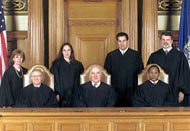Article from: www.thenewspaper.com/news/03/305.asp
4/5/2005
Connecticut High Court Bans Rental Car GPS Spying
Connecticut's Supreme Court rules that GPS-based speeding fees for rental companies are illegal.
 The Supreme Court of Connecticut has struck down the "excessive speeding" fee that New Haven-based rental company Acme Auto introduced in 2000, using a GPS device in the car to report any instances of speeding. The court unanimously ruled that the company's $150 charge for exceeding 79 MPH for more than 2 minutes was illegal, regardless of the clarity of notice given in the contract. The court found the amount charged far exceeded the additional wear and tear on the vehicle Acme claimed. From October to December 2000, 76 customers paid the speeding fee.
The Supreme Court of Connecticut has struck down the "excessive speeding" fee that New Haven-based rental company Acme Auto introduced in 2000, using a GPS device in the car to report any instances of speeding. The court unanimously ruled that the company's $150 charge for exceeding 79 MPH for more than 2 minutes was illegal, regardless of the clarity of notice given in the contract. The court found the amount charged far exceeded the additional wear and tear on the vehicle Acme claimed. From October to December 2000, 76 customers paid the speeding fee.
"You cannot secretly track drivers' speeds and gouge them under the guise of safety or vehicle expense," state Attorney General Richard Blumenthal said. "No logic or law warrants a private company ambushing consumers with a $150 fee for exceeding a random speed limit."
Full text of the decision (48k PDF Format)
Article Excerpt:Furthermore, using the hearing officer's calculation, a customer would have to travel more than 1070 miles at high speeds, without decelerating below eighty miles per hour, to cause $150 of excess wear on the vehicle. Presumably, the customer would have to stop to refuel several times, especially if driving at high speeds, to travel that distance. Each time the customer decelerated below eighty miles per hour, as would be required to refuel, the subsequent acceleration above seventynine
miles per hour would trigger another "occurrence" and another speeding fee. Thus, the rental vehicle could never suffer enough additional wear due solely to high speed driving to qualify the plaintiff's speeding fee as a liquidated damages charge.
Source: Speed Fees On Rental Cars Illegal, State High Court Says (Hartford Courant, 4/5/2005)
Permanent Link for this item
Return to Front Page
 The Supreme Court of Connecticut has struck down the "excessive speeding" fee that New Haven-based rental company Acme Auto introduced in 2000, using a GPS device in the car to report any instances of speeding. The court unanimously ruled that the company's $150 charge for exceeding 79 MPH for more than 2 minutes was illegal, regardless of the clarity of notice given in the contract. The court found the amount charged far exceeded the additional wear and tear on the vehicle Acme claimed. From October to December 2000, 76 customers paid the speeding fee.
The Supreme Court of Connecticut has struck down the "excessive speeding" fee that New Haven-based rental company Acme Auto introduced in 2000, using a GPS device in the car to report any instances of speeding. The court unanimously ruled that the company's $150 charge for exceeding 79 MPH for more than 2 minutes was illegal, regardless of the clarity of notice given in the contract. The court found the amount charged far exceeded the additional wear and tear on the vehicle Acme claimed. From October to December 2000, 76 customers paid the speeding fee.